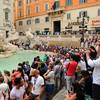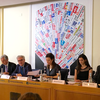After days of being rocked by post-Brexit shock waves, the Italian stock market rebounded a percentage point more or less across the board. But the fact remains that the "Brexit" referendum vote has fallout effects that could become devastating for Italy.
ROME -- After days of being rocked by post-Brexit shock waves, the Italian stock market turned mildly optimistic at mid-week, rebounding up a percentage point more or less across the board. But the fact remains that the British referendum vote to quit the European Union, 52% to 48%, has fallout effects that could become devastating for Italy.
The following day, in anticipation of a meeting of the Council of Europe in Brussels, Europe's Big Three -- Renzi, French President François Hollande and German Chancellor Angela Merkel -- looked and sounded stressed as they met informally in Berlin. Renzi has been accused of seeking special consideration within the EU over Italy's gigantic public debt, but at a press conference there Merkel declared stiffly that, "Some flexibility has been granted [by the EU] to certain countries in order to promote growth. Regarding Italy, above all, let me say that we've adopted various solutions, but we simply cannot rediscuss things every two years."
To this Renzi responded that, "We are not trying to change the political rules of the EU, which we respect, but we do want to protect the savings of our citizens. And let's not pretend that nothing has changed. Nor forget that Europe is made up not only of laws, but also of schools and museums, of culture, of innovation." (For a video of Renzi speaking in Brussels, see
>>)
Mario Draghi, the authoritative president of the European Central Bank, was singularly synthetic, giving his opinion on Brixit in a single word: "Tristezza" (Sadness). At a coincidental meeting of central bank governors held at Sintra in Portugal, Ignazio Visco, the governor of the Bank of Italy, and his fellow top European bankers carefully avoided using the word "Brexit" in their public pronouncements, but it was implicitly at the top of everyone's agenda. In a corridor talk with an Italian journalist Visco himself acknowedged that, "Brexit is a big shock. We have to be careful that it is not transformed into a crisis of the system."
Behind these immediate reactions is fear. Beppe Grillo, leader of the Movimento Cinque Stelle (M5S), is on record admitting that he is a fan and possible future ally of Nigel Farage, head of the pro-Brexit UKIP party. Pollsters here now give M5S only a few points behind the Partito Democratico (PD), which Renzi still heads, to considerable criticism. In latest polls the M5S, with around 30% of the vote,nis only 1% or 2% points behind the PD. For this reason is to Renzi's advantage that the anti-everything vote reflected by the M5S is split with Matteo Salvini's Northern League, with its 13% of the vote.
All this will come to a head in October, when Italy is slated to hold its own referendum. That vote calls for a constitutional reform which would radically downsize and emasculate the Senate, and for a revision of election laws called the "Italicum." By gambling his own government's future on its identification with the referendum, Renzi risks a Brexit ending, just as David Cameron had identified his government with the anti-Brexit campaign, and was forced to resign. Reinforced by the Brexit lesson, appeals are pouring in for Renzi to rethink his October referendum because a potential boomerang.
That referendum risks failure, in addition, because it is opposed by many who consider it simply undemocratic. In an open letter to Renzi, signed by such authoritative Italian intellectuals as Sandra Bonsanti, Paul Ginsborg, Tomaso Montanari, and Gustavo Zagrebelsky, the authors appealed to Renzi to show "a sense of responsibility" by not reducing the Constitution "to a personal question." A vote on an election law and a constitutional reform should not be put into the hands of a "momentary volatile majority." The Italicum, they wrote, "is a loaded pistol."





































i-Italy
Facebook
Google+
This work may not be reproduced, in whole or in part, without prior written permission.
Questo lavoro non può essere riprodotto, in tutto o in parte, senza permesso scritto.